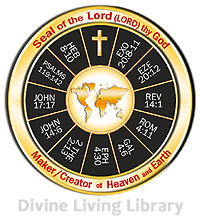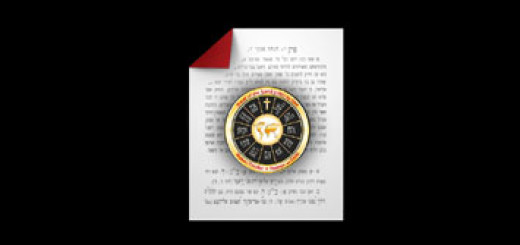
Administration of Oaths and Bonds
"which is administered by us to the glory of abundance which is administered by us."
Living Waters
The Living (Saints) Changed At The Parousia.
1 Cor. 15:51, 52—‘Behold, I shew you a mystery; we shall not all sleep, but we shall all be changed, in a moment, in the twinkling of an eye, at the last trump: for the trumpet shall sound, and the dead shall be raised incorruptible, and we shall be changed.’
This declaration supplies what was lacking in the statement made at ver. 24, and brings the whole into accordance with 1 Thess. 4:17. The language of St. Paul implies that he was communicating a revelation which was new, and presumably made to himself. It cannot be said that it is derived from any recorded utterance of the Saviour, nor do we find any corresponding statement in any other apostolic writing. But the question for us is, to whom does the apostle refer when he says, ‘We shall not all sleep,’ etc.? Is it to some hypothetical persons living in some distant age of time, or is it of the Corinthians and himself that he is thinking? Why should he think of the distant future when it is certain that he considered the Parousia to be imminent? Why should he not refer to himself and the Corinthians when their common hope and expectation was that they should live to witness the Parousia? There is no conceivable reason, then, why we should depart from the proper grammatical force of the language. When the apostle says ‘we,’ he no doubt means the Christians of Corinth and himself. This conclusion Alford fully endorses: ‘We which are alive and remain unto the coming of the Lord,—in which number the apostle firmly believed that he himself should be.’
The revelation, then, which the apostle here communicates, the secret concerning their future destiny, is this: That they would not all have to pass through the ordeal of death, but that such of them as were privileged to live until the Parousia would undergo a change by which they would be qualified to enter into the kingdom of God, without experiencing the pangs of dissolution. He had just before (ver. 50) been explaining that material and corruptible bodies of flesh and blood could not, in the nature of things, be fit for a spiritual and
heavenly state of existence: ‘Flesh and blood cannot inherit the kingdom of God.’ Hence the necessity for a transformation of the material and corruptible into that which is immaterial and incorruptible. Here it is important to observe the representation of the true nature of ‘the kingdom of God.’ It is not ‘the gospel;’ nor ‘the Christian dispensation;’ nor any earthly state of things at all, but a heavenly state, into which flesh and blood are incapable of entering.
The sum of all is, that the apostle evidently contemplates the event of which he is speaking as nigh at hand: it is to come to pass in their own day, before the natural term of life expires. And is not this precisely what we have found in all the references of the New Testament to the time of the Parousia? That event is never spoken of as distant, but always as imminent. It is looked for, watched for, hoped for. Some even leap to the conclusion that it has arrived, but their precipitancy is checked by the apostle, who shows that certain antecedents must first take place. We conclude, therefore, that when St. Paul said, ‘We shall not all sleep,’ he referred to himself and the Christians of Corinth, who, when they received this letter and read these words, could put only one construction upon them, viz. that many, perhaps most, possibly all of them, would live to witness the consummation which he predicted.
But the objection will recur, How could all this take place without notice or record? First, as regards the resurrection of the dead, it is to be considered how little we know of its conditions and characteristics. Must it come with observation? Must it be cognizable by material organs? ‘It is raised a spiritual body.’ Is a spiritual body one which can be seen, touched, handled? We are not certain that the eye can see the spiritual, or the hand can grasp the immaterial. On the contrary, the presumption and the probability are that they cannot. All this resurrection of the dead and transmutation of the living take place in the region of the spiritual, into which earthly spectators and reporters do not enter, and could see nothing if they did. A miracle may be necessary to empower the ‘unassisted eye’ to see the invisible. The prophet at Dothan saw the mountain full of ‘chariots of fire, and horses of fire,’ but the prophet’s servant saw nothing until Elisha prayed, ‘Lord, open his eyes, that he may see’.(2 Kin. 6:17) The first Christian martyr, full of the Holy Ghost, ‘saw the glory of God, and Jesus standing on the right hand of God,’ but none of the multitude that surrounded him beheld the vision. (Acts 7:56) Saul of Tarsus on the way to Damascus saw ‘that Just One,’ but his fellow-travellers saw no man. (Acts 9:7) It is not improbable that traditional and materialistic conceptions of the resurrection,—opening graves and emerging bodies, may bias the imagination on this subject, and make us overlook the fact that our material organs can apprehend only material objects. Secondly, as regards the change of the living saints, which the apostle speaks of as instantaneous,—‘
in a moment, in the twinkling of an eye;’—it is difficult to understand how so rapid a transition could be the subject of observation. The only thing we know of the change is its inconceivable suddenness. We know nothing of what residuum it leaves behind; what dissipation or resolution of the material substance. For aught we know, it may realise the fancy of the poet,
‘Oh, the hour when this material
Shall have vanished as a cloud.’
All we know is that ‘in a moment, in the twinkling of an eye,’ the change is completed; ‘the corruptible puts on incorruption, the mortal puts on immortality, and death is swallowed up in victory.’ What, then, hinders the conclusion that such events might have taken place without observation, and without record? There is nothing unphilosophical, irrational,
or impossible in the supposition. Least of all is there anything unscriptural, and this is all
we need concern ourselves about. ‘What saith the Scripture?’ Does the language of St. Paul plainly affirm or imply that all this is just about to take place, within the lifetime of himself and those to whom he is writing? No fair and dispassionate mind will deny that it is so. Right or wrong, the apostle is committed to this representation of the coming of Christ, the resurrection of the dead, and the transmutation of the living saints, within the natural lifetime of the Corinthians and himself. We are placed therefore in this dilemma,—
1. Either the apostle was guided by the Spirit of God, and the events which he predicted came to pass; or,
2. The apostle was mistaken in his belief, and these things never took place.







